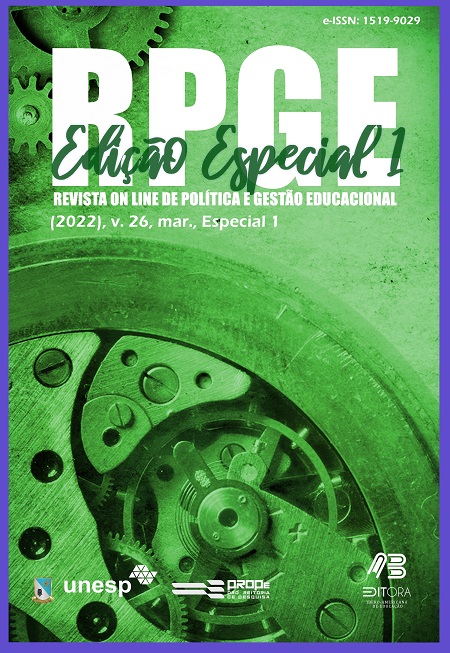The role of teachers in assessing educational quality
An experimental study
DOI:
https://doi.org/10.22633/rpge.v26iesp.1.16498Keywords:
Teacher’s role, Assessing educational quality, Experimental study, Ho Chi Minh CityAbstract
The purpose of this paper is to answer the question "Can teachers do the educational quality evaluation tasks?", in the context of lacking experts or well-trained staff to do this task in low and middle-income countries, such as Vietnam. In this study, the training on knowledge, soft skill, performance, and attitude were tested as the tool improving the teachers' performance in evaluating education quality. The study was based on a quasi-experimental design, cross-disciplinary, and mixed-evaluation methods. The study is cross-disciplinary as it examines the difference between the comparison and intervention group concerning personal factors and job attitude. The findings indicate that providing knowledge, soft skill practice, and positive job attitude help to improve the staff's performance in assessing the quality of education. The findings presented in this paper provide evidence of effectiveness of the education quality evaluation skills training in schools.
Downloads
References
BOSCARDIN, M. L. The administrative role in transforming secondary to support inclusive evidence-based practices. 2005.
BROCHADO, A. Comparing alternative instruments to measure service quality in higher education. Quality Assurance in Education, v. 17, n. 2, p. 174-190, 2009.
CPD. Learning culture for teachers. How do we define quality in education linked to curriculum planning, pedagogical input and learning outcomes? Available: https://www.learningcultures.org/newsletters/98-how-do-we-define-quality-in-education. Access: 10 Jan. 2021.
CHAPMAN, D.; ADAMS, D. Education in Developing Asia. The quality of Education: Dimensions and Strategies. Asian Development Bank, 2020. v. 5.
HANG, L. T.; VAN, V. H. Building strong teaching and learning strategies through teaching innovations and learners’ creativity: a study of vietnam universities. International Journal of Education and Practice, v. 8, n. 3, p. 498-510, 2020. DOI: 10.18488/journal.61.2020.83.498.510
IBRAHIM, H. A. Quality Assurance and Accreditation in Education, Open Journal, v. 2, n. 2, p. 106-110, 2014.
NHA, P. X. Vietnam’s education in the context of the Fourth Industrial Revolution. Communist Review, 2018. Available: http://english.tapchicongsan.org.vn. Access: 10 Jan. 2021.
SIRIAM. 15 ways to improve education quality and student achievement with outcome-based education. 2019. Available: https://www.creatrixcampus.com/blog/15-ways-to-improve-education-quality-and-student-achievement-with-outcome-based-education. Access: 10 Jan. 2021.
STOBIERSKI, T. Skills you need to robot-proof your career in quality assurance. Northeastern University, 2018. Available: https://www.northeastern.edu/graduate/blog/quality-assurance-skills/. Access: 10 Jan. 2021.
TEMIZER, L.; TURKYILMAZ, A. Implementation of student satisfaction index model in higher education institutions. Procedia - Social and Behavioral Sciences, v. 46, p. 3802-3806, 2012.
TRUNG, N. S.; VAN, V. H. Educating Traditional Cultural Values in Vietnam Universities. South Asian Research Journal of Humanities and Social Sciences, v. 2, p. 3210-214, 2020.
TRUNG, N. S.; VAN, V. H. Vietnamese Cultural Identity in the Process of International Integration. Journal of Advances in Education and Philosophy, v. 4, n. 6, p. 220-225, 2020.
UNDP 17 GOALS. 2015. Available: https://www.un.org/sustainabledevelopment/development-agenda/. Access: 10 Jan. 2021.
VAN, V. H. Social responsibility of students: the role and importance of education. Journal of Natural Remedies, v. 21, n. 8-1, p. 241-254, 2020. Available: https://jnronline.com/ojs/index.php/about/article/view/560. Access: 10 Jan. 2021.
VVOB's Definition of quality education. 2020. Available: https://www.vvob.org/en/visionandmission. Access: 10 Jan. 2021.
Published
How to Cite
Issue
Section
License
Copyright (c) 2022 Revista on line de Política e Gestão Educacional

This work is licensed under a Creative Commons Attribution-NonCommercial-ShareAlike 4.0 International License.
Manuscritos aceitos e publicados são de propriedade da Revista on line de Política e Gestão Educacional. É vedada a submissão integral ou parcial do manuscrito a qualquer outro periódico. A responsabilidade do conteúdo dos artigos é exclusiva dos autores. É vedada a tradução para outro idioma sem a autorização escrita do Editor ouvida a Comissão Editorial Científica.











